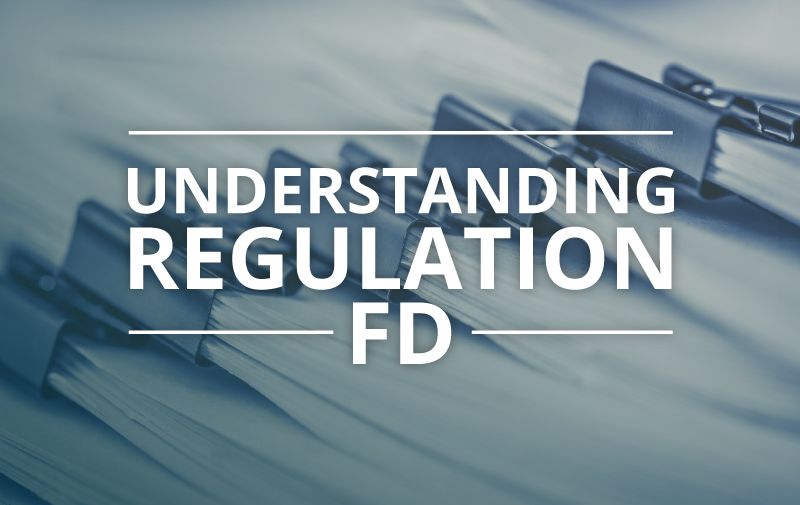Regulation Fair Disclosure (Reg FD)
Regulation FD prohibits companies from disclosing material nonpublic information to select analysts, institutional investors and others without making widespread public disclosure. The rule reflects the view that all investors should have equal access to a company’s material disclosures at the same time. Since its enactment in 2000, Reg FD has fundamentally reshaped the ways public companies conduct conference calls, group investor meetings and 1×1 meetings with analysts and investors.
Here are six frequently asked questions about Reg FD and some examples of violations:
1 | Why was Reg FD Adopted? The SEC adopted Reg FD to address the selective disclosure by issuers. The goal of Reg FD is to level the playing field between investors, and between potential investors and the investing public.
2 | What Does Reg FD Require? Under Reg FD, whenever a public company, or any person acting on its behalf, discloses material nonpublic information to certain enumerated persons, the company must disclose that information to the public.
3 | Which Employees are Covered by Reg FD? Regulation FD applies to all public companies and any “person acting on behalf of the company.” This definition includes the following individuals:
- Senior company officials (a director, executive officer, investor relations or public relations officer, or other person with similar functions), including individuals acting under their direction; and
- Other officers, employees, or agents of the company who regularly communicate with securities market professionals or security holders.
4 | What Constitutes “Material Information” for Purposes of Reg FD? Information is considered material if there is a “substantial likelihood that a reasonable shareholder would consider it important” in making an investment decision, or if the facts “would have been viewed by the reasonable investor as having significantly altered the ‘total mix’ of information made available.” The following are likely considered material:
- earnings information (including historical or earnings guidance);
- mergers, acquisitions, tender offers;
- joint ventures or changes in assets;
- new products or discoveries;
- developments regarding customers or suppliers, such as the acquisition or loss of a contract;
- changes in control or management;
- change in auditors or auditor notification that an issuer may no longer rely on an auditor’s report;
- defaults on senior securities;
- stock splits or dividends;
- redemptions or repurchases of securities;
- public or private sales of securities; and bankruptcy.
5 | What is “Nonpublic Information” for Purposes of Reg FD? Essentially, information is “nonpublic” if it is not available to investors generally. For information to be made public, “it must be disseminated in a manner calculated to reach the securities marketplace through recognized channels of distribution, and public investors must be afforded a reasonable waiting period to react to the information.”
6 | What Communications are Exempt from Reg FD? Reg FD specifically excludes certain communications from the scope of the regulation. These exempted disclosures generally fit into the following three categories:
- Communications to a person who owes the issuer a duty of trust or confidence. This would include counsel, financial advisers, and other so‐called “temporary insiders.”
- Communications to any person who expressly agrees to maintain the information in confidence.
- Communications in connection with a registered securities offering.
Examples of Reg FD Violations
1 | Netflix (2012)
What Happened? Netflix CEO posted on his personal Facebook page – with over 200,000 subscribers – that monthly viewing had exceeded 1 billion users for the first time. While the materiality was debated, the SEC action drew attention as it suggests that a Facebook post – even if widely distributed and on a platform that anyone can access – was not recognized as an appropriate dissemination method.
SEC Action. Netflix received a Wells notice from the staff at SEC indicating their intent to recommend that the SEC institute a cease-and-desist proceeding and/or bring a civil injunctive action against Netflix and its CEO for violations of Reg FD and certain Securities Exchange Act provisions.
2 | Office Depot (2010)
What Happened? Office Depot’s IR Director, with the knowledge and consent of its then-CEO and CFO, indirectly selectively disclosed material earnings guidance to certain analysts by referencing companies that were also experiencing declining results. Six days later the company publicly disclosed the information.
SEC Action. The Commission brought administrative and civil actions against the company, resulting in it consenting to a cease-and-desist order and a paying civil penalty of $1,000,000.
3 | First Solar (2013)
What Happened? Prior to a press release, the former head of investor relations at First Solar had phone conversations with several analysts and investors to let them know that the company was unlikely to receive a much-anticipated loan guarantee from the U.S. Department of Energy. When the company disclosed this material information the next morning, the stock dropped 6 percent.
SEC Action. The Commission brought administrative and civil actions against the company, resulting in it consenting to a cease-and-desist order and a paying civil penalty of $1,000,000. The former head of IR agreed to settle the charges for $50,000.
We have worked with hundreds of healthcare companies, providing modules of a Wall Street Educational Series that covers a broad subject range such as Reg FD, insider trading, social media and other topical issues. We work with executives to fully understand and comply with SEC rules as well as best practices for disclosures, Q&A preparation and educating their broad employee base. Our programs are customized and effective – with practice scenarios and quizzes on hot buttons. Give us a call if your team could benefit from a primer or refresh on the rules!
Lynn Pieper Lewis, Founder & CEO


Leave a Reply